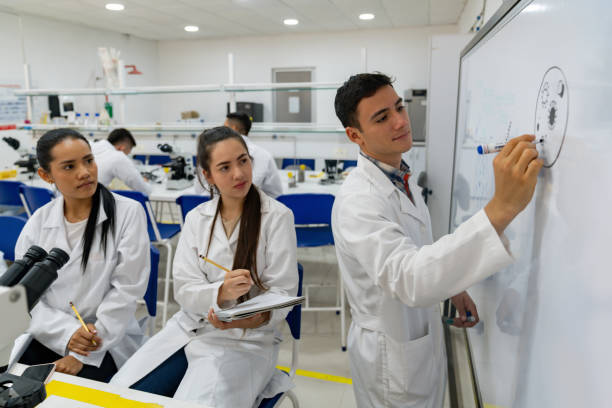Rearticle is live! Explore the complete research & publishing suite at Rearticle.io
How Top PhD Applicants Choose a Lab
For aspiring PhD candidates, selecting the right research lab is a pivotal decision that can shape their academic and professional futures. With numerous factors to consider, applicants meticulously evaluate labs to find the best fit for their interests and career goals. This blog delves into the key elements that influence top PhD applicants when choosing a lab, providing insights for professors looking to attract the brightest minds.
Saiganesh Chidambaram
12/30/20243 min read


1. Research Focus and Interests
Alignment between a candidate's interests and the lab's research is fundamental.
Specific Projects: Applicants often look for labs conducting research that excites them or aligns with their previous experience. They may seek out labs working on groundbreaking projects or niche areas that match their passions.
Innovative Research: Labs known for pioneering new methods or theories are attractive to candidates eager to contribute to cutting-edge science. Highlighting your lab's innovative work can draw in ambitious students.
2. Lab's Publication Record
A strong publication record signals productivity and impact.
High-Impact Journals: Frequent publications in reputable journals like Nature, Science, or field-specific top journals indicate that the lab produces high-quality research recognized by the scientific community.
Citation Metrics: A high number of citations suggests that the lab's work is influential and contributes significantly to the field. Applicants may use tools like Google Scholar or Web of Science to assess these metrics.
3. Online Presence and Website
An informative and engaging online presence helps candidates learn about your lab.
Up-to-Date Website: Ensure your website includes detailed descriptions of current projects, lab members, publications, and contact information. Regular updates reflect an active and dynamic research environment.
Social Media Activity: Active profiles on platforms like Twitter, LinkedIn, or ResearchGate can showcase recent achievements, publications, and events. Social media also provides a glimpse into the lab's culture and values.
4. Reputation of the Principal Investigator (PI)
The PI's standing in the academic community influences applicant decisions.
Academic Standing: A PI with a strong reputation, awards, or leadership positions in professional organizations attracts candidates seeking mentorship from esteemed scholars.
Mentorship Style: Applicants may research the PI's approach to mentorship by reading lab reviews, alumni testimonials, or talking to current lab members. They value PIs who are supportive, accessible, and invested in their students' success.
5. Lab Culture and Environment
A positive lab culture enhances the PhD experience.
Team Dynamics: Candidates prefer collaborative environments where teamwork is encouraged, and lab members support each other. A friendly atmosphere contributes to well-being and productivity.
Diversity and Inclusion: Labs that demonstrate a commitment to diversity and inclusion are more appealing to candidates from various backgrounds. This can include diverse representation among lab members and inclusive policies.
6. Funding and Resources
Access to resources affects the feasibility and scope of research projects.
State-of-the-Art Facilities: Labs equipped with advanced technology and equipment enable students to conduct high-quality research. Highlighting these resources can attract candidates eager to work with the latest tools.
Stable Funding: Consistent funding ensures that projects can proceed without interruption and that students have opportunities for professional development activities like attending conferences.
7. Career Development Opportunities
Candidates consider how a lab will support their future aspirations.
Networking Opportunities: Labs with strong connections to industry, academia, or government agencies can provide pathways to postdoctoral positions or employment after graduation.
Skill Development: Opportunities to learn new techniques, engage in interdisciplinary research, or develop soft skills like leadership and communication are highly valued.
8. Location and Lifestyle
Personal preferences regarding the lab's geographic location can influence decisions.
Geographic Location: Factors such as climate, cost of living, cultural attractions, and proximity to family can play a role. Some candidates may prefer urban centers with vibrant communities, while others might opt for quieter, rural settings.
Work-Life Balance: Labs that promote a healthy balance between work and personal life are more attractive. Policies on flexible working hours, mental health support, and extracurricular activities can make a difference.
9. Peer Recommendations and Alumni Success
The experiences of others provide valuable insights.
Testimonials: Positive feedback from current or former lab members about their experiences can reassure candidates about the lab environment and mentorship quality.
Alumni Trajectories: Successful careers of former students, such as prestigious postdoctoral positions, faculty appointments, or industry leadership roles, indicate that the lab effectively prepares students for the next steps.
Conclusion
Top PhD applicants undertake a comprehensive evaluation when choosing a research lab, considering factors ranging from research focus to lab culture. For professors aiming to attract exceptional candidates, maintaining a strong online presence, fostering a supportive environment, and showcasing a robust publication record are crucial strategies. By understanding and addressing the priorities of prospective students, labs can position themselves as desirable destinations for the next generation of researchers.
Company
Scholarly Services
Rearticle
© 2025 Genik Scientific Inc.
Serving the Einsteins & Teslas of the 21st Century
